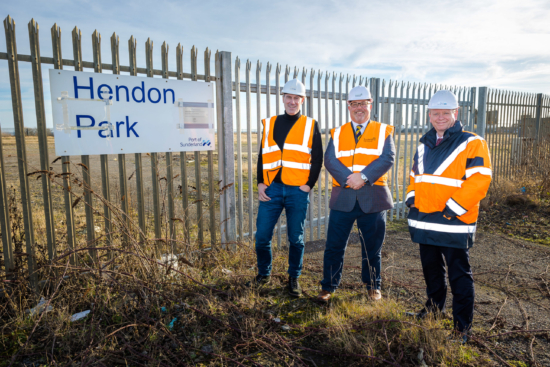Wastefront’s Sunderland tyre recycling plant gains planning permission
 Wastefront CEO Vianney Vales at Port of Sunderland with Cllr Graeme Miller and Matthew Hunt (Port of Sunderland) (Photo: Wastefront)
Wastefront CEO Vianney Vales at Port of Sunderland with Cllr Graeme Miller and Matthew Hunt (Port of Sunderland) (Photo: Wastefront)
At the end of January, Wastefront AS received permission to press on with plans to construct the ‘UK’s greenest tyre recycling plant’ at the Port of Sunderland. Construction on the development is expected to begin this year (2022), with company executives confident that the plant will be in commercial operation by 2024, creating around 100 skilled jobs.
Described as “the largest ever investment at the North Sea hub”, Wastefront’s £25 million tyre recycling operating business will convert end-of-life tyres (ELTs) into their constituent commodities, including biofuels and carbon black. The firm’s decision to invest in Port of Sunderland was influenced by co-founder and director, Christian A. Hvamstad, an alumnus of the University of Sunderland.
Speaking about the news Hvamstad said: “We are thrilled to have secured planning approval for this landmark site, which marks a huge step in our efforts to combat the global issue of ELT waste. Our ambition is to create a Green Global Industrial Platform for dealing with waste issues, and a crucial element of sustainable waste handling is to be able to do so locally. Wastefront’s first UK plant will represent a valuable contribution to a cleaner future by dealing with a specific waste problem, where end-of-life tyres no longer end up in landfills in overseas countries, but instead are converted into useful commodities that can be used within the region. The UK is a global centre of industry which we’re proud to be part of, while Sunderland is the ideal location for our first plant due to geographical location, access to feedstock, strong local support and Sunderland’s history as an industrial city.”
Since unveiling plans for the recycling plant in August 2020, Wastefront has secured a decisive 10-year supply deal with energy giant Vitol, which will see the world’s largest independent oil trader purchase all of the Sunderland plant’s available liquid hydrocarbons.
The approval of the planning application for the Sunderland plant is the result of the successful project development approach taken by Wastefront and its partners, focusing on the constant de-risking of the Project.
In preparation for the next phase of the Project, the Execution phase, Wastefront has also appointed Technip Energies, one of the largest and most respected engineering, procurement and construction (EPC) companies in the world, as their partner for the build of the Sunderland plant.
Vianney Vales, CEO at Wastefront, added: “We continue to progress as per our plan with the implementation of our game-changing facility in Sunderland. This facility is an example of what the industry of the future can be, re-utilizing a material that is currently wasted, used tyres, and converting it fully into valuable products through an exceptionally circular and environmentally-friendly process. We worked closely with our partners Devaltec and TechnipEnergies in the development and configuration of this plant to ensure it adheres to the current and future climate and environmental standards. As a result, this plant is designed to operate with no harm to the environment and the community.
“The approval of our planning application shows the Planning Authority and the Environmental Agency support our approach, and speaks volumes about the quality and maturity of our project development. Obtaining a planning approval is a pivotal moment in time in any industrial project. Following the selection of TechnipEnergies as our EPC partner which we announced earlier this year, this is yet another confirmation of Wastefront’s ability to execute its plans…”
A recent report by the Social Market Foundation named Sunderland the second-best place in the UK for businesses looking to capitalise on the shift to decarbonisation, with the city scoring highly in its access to talent, green business clusters and the number of skilled workers with the transferable skills to help drive the UK’s green economy.
Cllr Graeme Miller, leader of Sunderland City Council, added: “This is absolutely fantastic news not only for Sunderland, but the entire UK…Not only is this a fantastic story for the circular economy in terms of waste pollution, but it is also a fantastic circular economy success story for the city…”

 Photo: Grupo Andrés
Photo: Grupo Andrés Enso
Enso
Comments